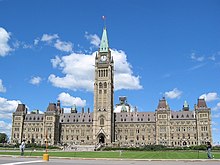Civil Marriage Act
| Civil Marriage Act | |
|---|---|
 |
|
| An Act respecting certain aspects of legal capacity for marriage for civil purposes | |
| Citation | S.C. 2005, c. 33 |
| Enacted by | House of Commons of Canada |
| Enacted by | Senate of Canada |
| Date assented to | 20 July 2005 |
| Date commenced | 20 July 2005 |
| Legislative history | |
| Bill introduced in the House of Commons of Canada | Bill C-38, 38th Parliament, 1st Session |
| Introduced by | Irwin Cotler, Minister of Justice |
| First reading | 1 February 2005 |
| Second reading | 4 May 2005 |
| Third reading | 28 June 2005 |
| Committee report | 16 June 2005 |
| Bill introduced in the Senate of Canada | Bill C-38 |
| First reading | 29 June 2005 |
| Second reading | 6 July 2005 |
| Third reading | 19 July 2005 |
| Committee report | 18 July 2005 |
| Keywords | |
| Same-sex Marriage | |
| Status: Current legislation | |
The Civil Marriage Act (full title: "An Act respecting certain aspects of legal capacity for marriage for civil purposes") was legislation legalizing same-sex marriage across Canada. At the time the bill became law, same-sex marriage had already been legalized by court decisions in all Canadian provinces except Alberta and Prince Edward Island, as well as in the territories of Nunavut and the Northwest Territories.
It was introduced as Bill C-38 in the first session of the 38th Canadian Parliament on February 1, 2005. It passed the House of Commons on June 28, 2005, and the Senate on July 19, 2005. The Act became law when it received Royal Assent on July 20, 2005.
As with all federal legislation in Canada, the Act is written in both French and English, with equal force. The French title is Loi sur le mariage civil, or in full, Loi concernant certaines conditions de fond du mariage civil.
This is the Act's official legislative summary:
The short title of the act (Civil Marriage Act) is defined in Section 1. Sections 2 through 4 form the substance of the Act, and were the key points of contention during its debate in the House of Commons and the Senate. Section 3.1 was added with an amendment during the committee stage, and was subsequently adopted by the House of Commons.
The remaining sections are "consequential amendments" that simply adjust the wording of existing acts to conform to this one.
As a government bill, C-38 represented the official position of Paul Martin's Liberal government, and the cabinet were thus bound to vote in its favour. Liberal backbenchers and members of the Conservative Party and Bloc Québécois had a free vote. In accordance with its party policy on LGBT rights, the New Democratic Party (NDP) whipped its members in favour. Bev Desjarlais defied the whip and was removed from her critic position. (She was not nominated for the next election by her riding association, and subsequently chose to sit as an independent for the remainder of the session.) Conservatives tended to vote against the Act, while Bloquistes tended to vote in favour. At least two cabinet ministers stepped down to vote against the bill. Joe Comuzzi resigned just hours before the final vote on the Act, and Martin lamented his leaving. As expected, Comuzzi voted against the Act.
...
Wikipedia
